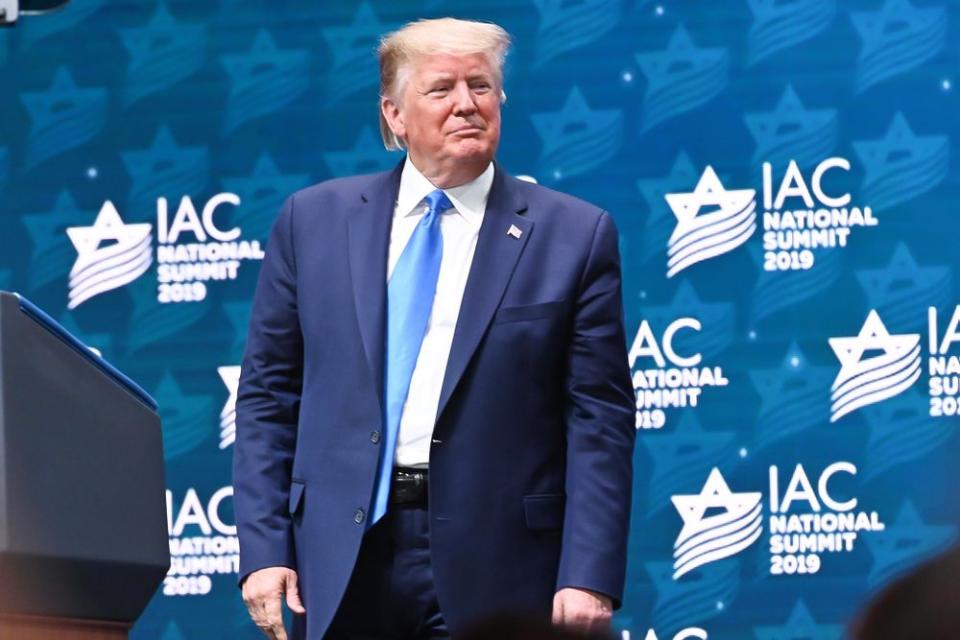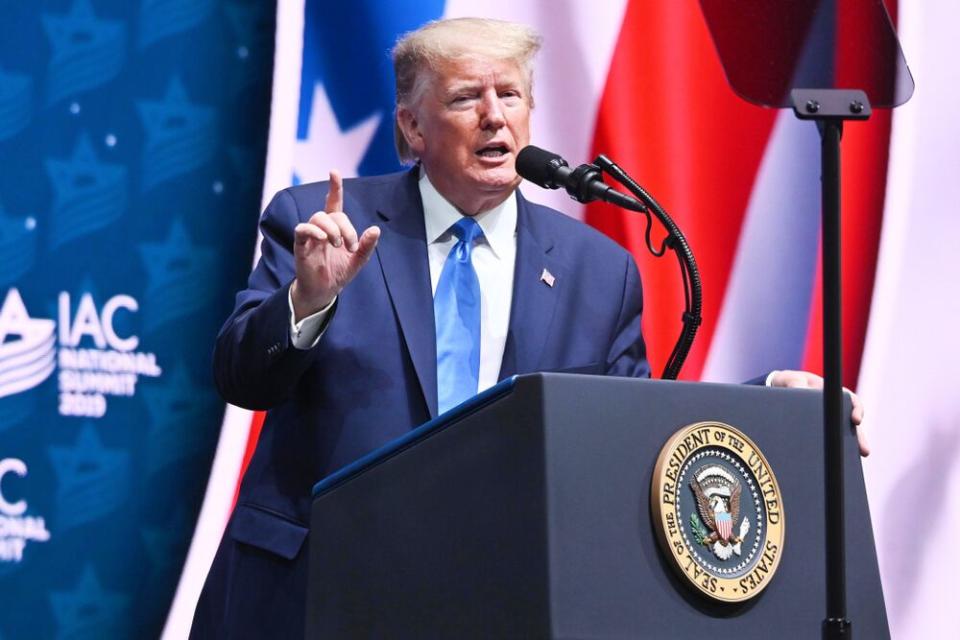Donald Trump Is Strengthening the Government's Definition of Anti-Semitism — as Critics Decry 'Hypocrisy'
President Donald Trump is reportedly expected to sign an executive order Wednesday to push back on rising anti-Semitism on college campuses by instructing the government to broaden how it defines Jewish discrimination.
The move was lauded by some in the Jewish community, given a troubling backdrop of recent incidents. But critics, including other Jews, described it as hypocritical and anti-free speech, and they said it could do more harm than good.
The New York Times first reported that Trump would sign the order, which would compel colleges receiving federal money to more aggressively police anti-Semitism on campuses under Title VI of the landmark Civil Rights Act of 1964.
While the Times described the order as reclassifying Judaism, in the government’s view, as a nationality or race, a draft text of the order leaked on Wednesday ahead of the signing showed otherwise. The text stated that it would direct federal authorities to refer to the International Holocaust Remembrance Alliance’s working definition of anti-Semitism.
Religion is not protected under the Title VI provision, which prohibits discrimination “on the ground of race, color, or national origin” at schools receiving federal funding. The order, according to leaked draft text, states “it shall be the policy of the executive branch to enforce Title VI against prohibited forms of discrimination rooted in anti-Semitism as vigorously as against all other forms of discrimination prohibited by Title VI.”
According to the Associated Press, “Trump will broaden the federal government’s definition of antisemitism … [and] is expected to tell the Department of Education to consider the International Holocaust Remembrance Alliance’s definition of anti-Semitism — which can include criticism of Israel — when evaluating discrimination complaints under Title VI of the Civil Rights Act.”
The IHRA definition the order cites does include, as examples of anti-Semitism, certain criticisms of Israel such as “claiming that the existence of a State of Israel is a racist endeavor” and “applying double standards by requiring of it a behavior not expected or demanded of any other democratic nation.”
However, the definition also stipulates “criticism of Israel similar to that leveled against any other country cannot be regarded as antisemitic.”
The almost immediate reaction to Trump’s executive order, both pro and con, underlines a paradoxical tension in his presidency: While he has closely aligned himself with Israel’s current conservative government, he has also provoked ire for his tepid criticism of white supremacists in the U.S., including after a deadly rally in Charlottesville, Virginia, in 2017.
Last week, Trump faced backlash for seeming to invoke an ugly stereotype about Jewish people as more wealthy than moral. He told attendees at the Israeli American Council National Summit in Florida that they would vote for him in 2020 even if they disliked him because “you’re not going to vote for the wealth tax.”

The order will also mean the Trump administration is wading into a larger, thornier debate about where criticism of Israel falls and the difference between criticism of Israel’s political actions and its people.
Some see the executive order as a way to combat the BDS movement, which has gained greater support in progressive circles in campuses across the country.
BDS stands for Boycott, Divestment and Sanctions. A pro-Palestinian movement in the ongoing conflict between the Palestinians and Israel, BDS contends “Israel is occupying and colonising Palestinian land, discriminating against Palestinian citizens of Israel and denying Palestinian refugees the right to return to their homes.”
BDS opponents say it offers a nominal face to anti-Semitism rather than being legitimate political protest.
One government official, speaking anonymously, contended to the AP that the order was not meant to limit anti-Israeli speech such as the BDS movement.
Jonathan Greenblatt, the chief executive of the Anti-Defamation League, told the Times the group welcomes the executive order in hopes that it “will be enforced in a fair manner.”
The group, Greenblatt said, recorded its third-highest level of anti-Semitic incidents in the U.S. last year.
“The fact of the matter is we see Jewish students on college campuses and Jewish people all over being marginalized,” he said. “The rise of anti-Semitic incidents is not theoretical; it’s empirical.”

But others said they worried the executive order would thwart speech, meaning pro-Palestinian views on college campuses would be silenced.
A spokesperson for the American Jewish Committee, a global Jewish advocacy group, released a statement on Wednesday in support of the order.
“We trust that a careful application of this directive will enable university administrators to avoid running afoul of free speech protections as they seek to root out antisemitism on their campuses,” AJC CEO David Harris said.
The statement continued on to say the situation for Jewish students in the U.S. is “most worrisome” and that it doesn’t consider the executive order to be designed to silence “rational” criticism against Israel and its policies.
The AJC was among the Jewish advocacy groups criticizing the president for his remarks in Florida last weekend.
RELATED: All of the Ways a President — Including Donald Trump — Can Be Removed from Office
The Jewish Democratic Council of America was quick to label Trump’s executive move as “the height of hypocrisy” on Wednesday in a statement of its own.
“It is the height of hypocrisy for President Trump to sign an executive order (EO) that he claims will combat anti-Semitism,” the organization said. “President Trump is more interested in symbolic gestures that politicize Israel and use Jews as political pawns than actually doing something meaningful to ensure our security and that of Israel.”
Trump is scheduled to host a Hanukkah reception at the White House on Wednesday.
“The timing of this signing reveals this is a PR stunt, plain and simple,” the Jewish Democratic Council of America statement continued. “If Republicans truly cared about combating anti-Semitism, they would also recognize and respond to the scourge of hatred perpetuated by the President of the United States.”

